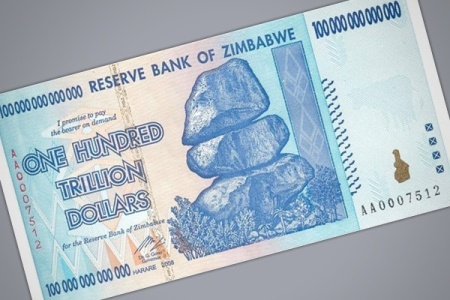1149
22 facts about inflation

Zimbabwe is a leader in the number of zeros on the most valuable dollar bill (100 000 000 000 000).
Dollar 1950 is now estimated at 12 cents.
The term "inflation" is derived from the Latin term «inflare», which means "to blow up or fly", and the word was first used in the monetary field to describe the "increase in the quantity of money" in 1838. Today, economists often argue about the definition of inflation, but generally agree that the worldwide rise in prices continues! At that time, the cost of money itself is declining.
Inflation is characterized by the percent increase in the price of goods per year. For example, if the inflation rate is 2%, the candy worth $ 1 a year, you can buy 1, 02 dollars.
The annual inflation rate in the United States have significant variations throughout history, ranging from nearly zero inflation, and ending at 23%. In turn, the federal government is trying to keep inflation within 2-3%.
The total costs of the civil war in 1860 amounted to 6.7 billion today, adjusted for inflation, this amount is equivalent to 139 billion. Historians believe that the indirect costs (eg, destruction of the economy of neighboring countries) would equal 46 trillion dollars in current money.
Filming Cleopatra walked creators in $ 44 million in 1963. In our time, shooting the same film today would cost $ 300 million.
Hyperinflation occurred in Germany in 1920, referring to the great social unrest. The purchasing power of money has fallen so low that the German currency was cheaper than wood.
After WWII hyperinflation of Hungary has broken records for the fastest monthly increase in inflation for all time: 41 900 000 000 000 000% in July 1946, which means that prices doubled every 13, 5:00.
Historians cite the example of galloping inflation as one of the main reasons for the fall of ancient Rome.
Twenty-eight hyperinflations happened in the 20th century, twenty of them occurred after 1980.
In 2008, the three countries with the highest inflation were: Zimbabwe (12,563%), Burma (35%) and Guinea (23, 4%). And with the lowest inflation rates were: Naru (-3.6%), San Marino (-1, 5%) and Burkina Faso (0, 2%).
Historians claim that the war and inflation linked. Every war in the last century led to a high inflation rate.
The United States experienced two currency fall because of inflation. First Continental currency collapse was during the Revolutionary War. Second, the Confederate during the Civil War.
Imports of gold and silver from the New World caused massive inflation in Europe between the 15th and 17th centuries.
When gold is used as the underpinning the currency, inflation may still occur even if the government dilutes the gold with other metals such as silver, copper or lead, in order to increase the money supply.
The high mortality rate during the bubonic plague in Europe, increased supply of affordable rates, which, in turn, creates a significant inflation until mid-1370's. Higher inflation reduces the purchasing power of workers' wages, so that even if they were paid more, their high wages still could not afford to buy other goods.
Nations that have adhered to the gold standard in the 19th century until 1914 there were very few, but they do not know the problems with inflation.
There is usually not a cause for inflation, and at least two generally accepted theories: (1) the rise in prices as a "cost inflation", and (2) "inflation possible", that is, when people's ability to spend is growing faster than the presence of goods and services.
If inflation is under control of the state, this fact can be a positive force for the economy. It can stimulate the economy, to mitigate recessions provide profit enterprise, provoke higher wages for workers, and reduce the actual amount of public debt.
Over the past decade, the dollar has lost 21% of its purchasing power.
Taking into account inflation, the top five highest-grossing films of all time are: "Gone with the Wind" (1 606 254 800 $), "Star Wars" (1 416 050 800 $), "The Sound of Music" (1 132 202 200 $) "Supernatural" (1 127 742 000 $), and "The Ten Commandments" (1 041 450 000 $).























